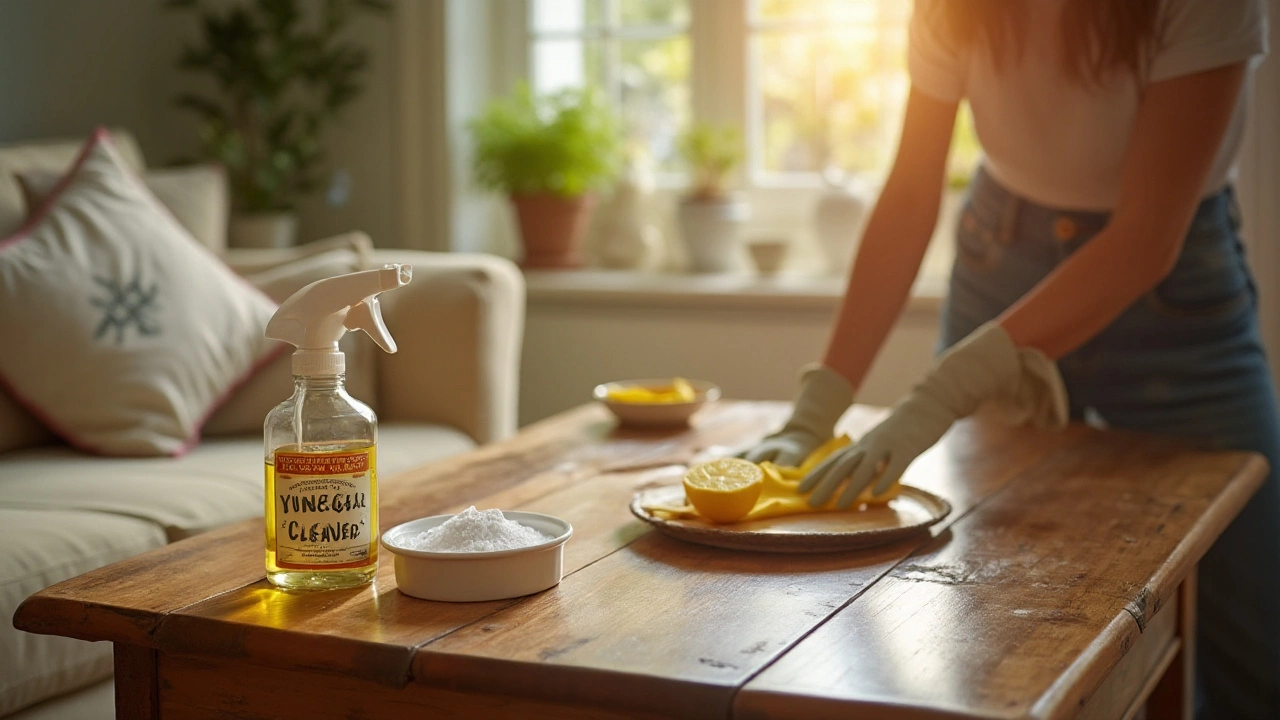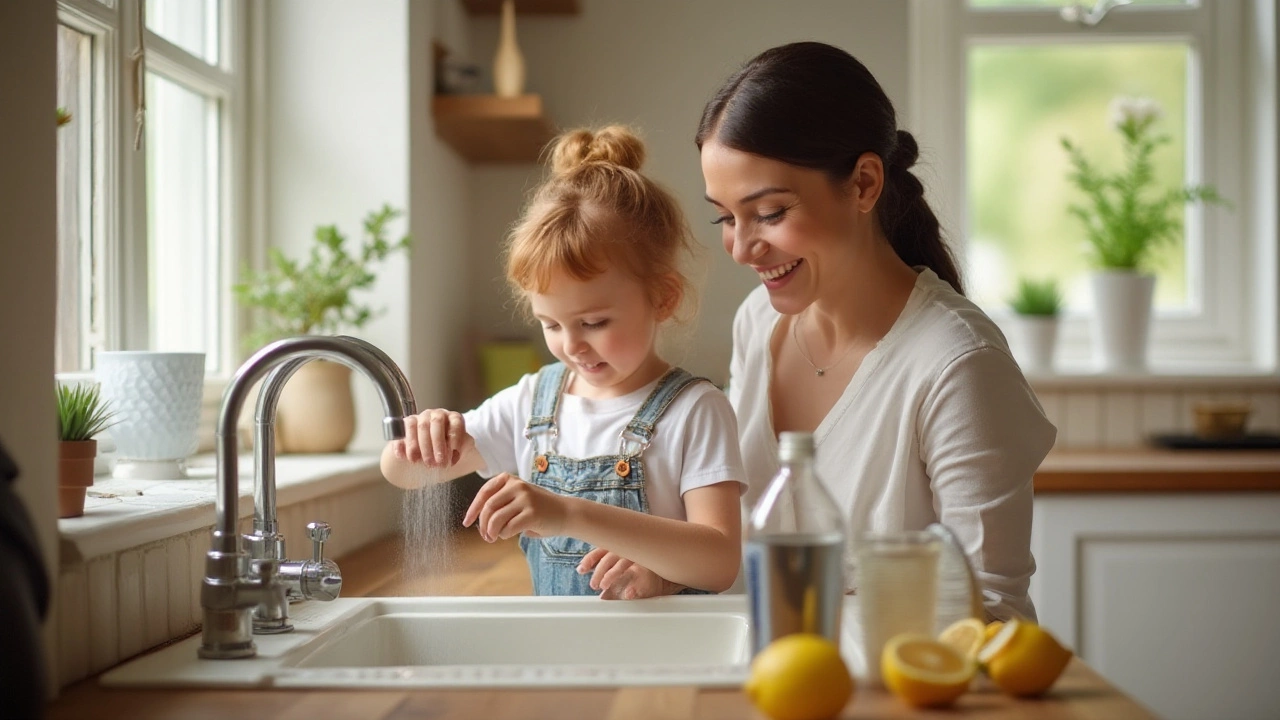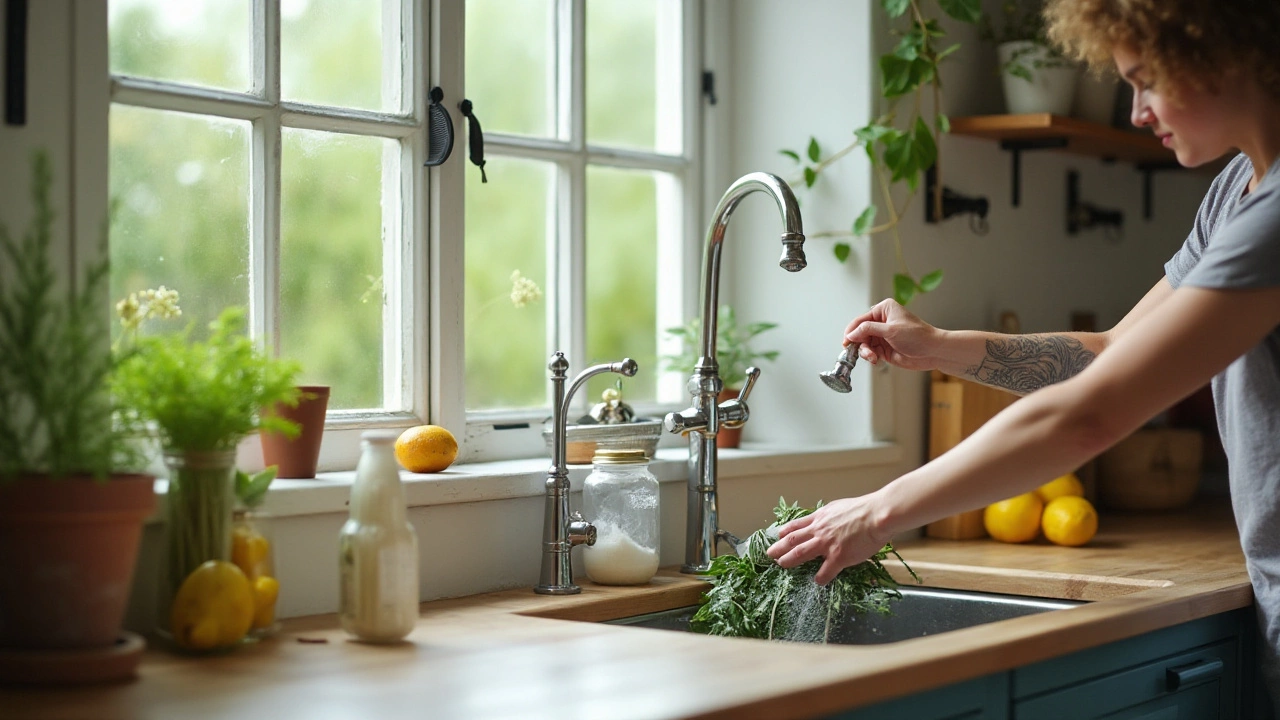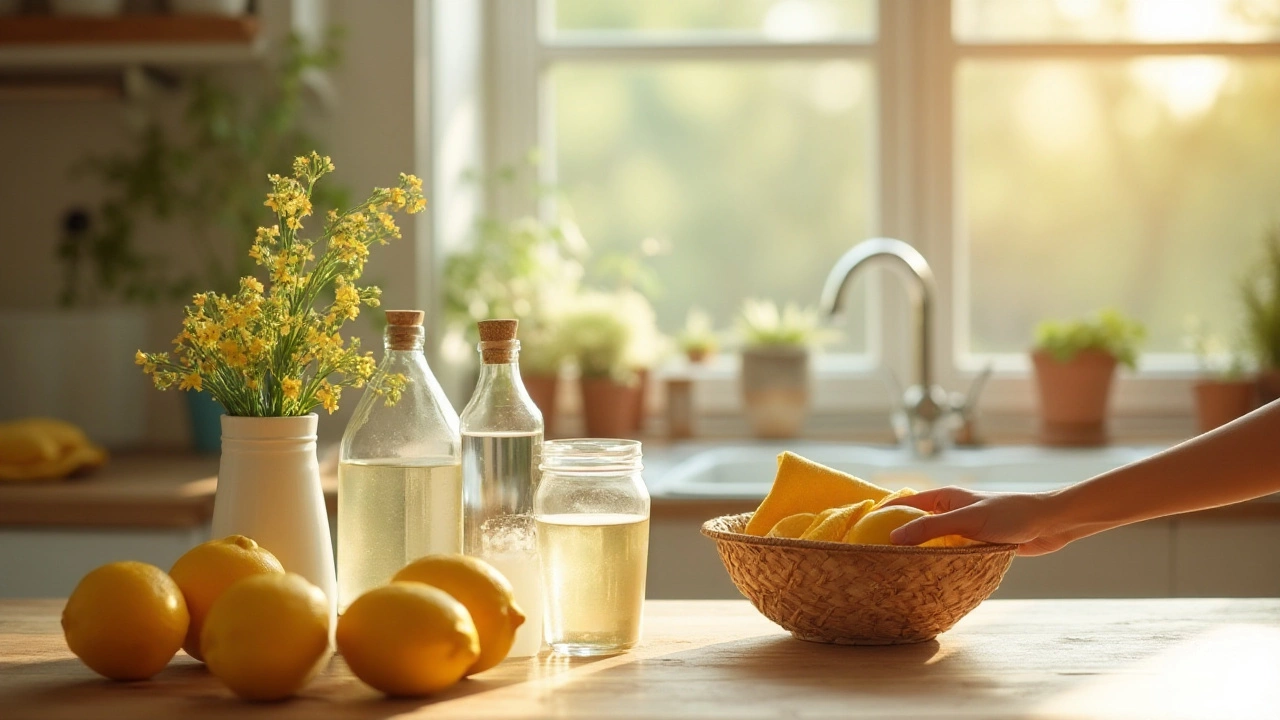When it comes to keeping homes clean and fresh, natural cleaning agents are gaining the spotlight not only because they work but also because they’re a friend to the environment. Stepping away from harsh chemicals and embracing nature’s own brilliance can transform the way you clean.
Among the stars of green cleaning solutions are vinegar, baking soda, and lemon. These household staples not only excel in their individual cleaning abilities but also provide a sustainable choice that helps reduce synthetic waste and exposure in our daily lives. Whether it’s fighting grime, deodorizing spaces, or brightening surfaces, these natural wonders are poised to meet the challenge.
Let’s delve into how each of these natural agents contributes to a cleaner, greener home, with some handy tips on how to make the most out of their cleansing capabilities every day.
- The Power of Vinegar
- Baking Soda's Versatility
- Lemon's Natural Freshness
- Tips for Eco-Friendly Cleaning
The Power of Vinegar
Vinegar, an unassuming pantry staple, boasts an impressive range of cleaning prowess that's hard to overlook. With its natural acidic properties, primarily due to acetic acid, vinegar has stood the test of time as a natural cleaning agent. The acidity makes it effective at breaking down mineral deposits, cutting through grease, and even neutralizing odors. Numerous households rely on vinegar for its ability to tackle hard water stains and soap scum, while also being an eco-friendly alternative to chemical-based cleaners. Imagine your showerhead, clogged with mineral deposits, given a new lease on life with nothing more than an overnight soak in vinegar. This simple yet elegant solution highlights the practicality and efficiency vinegar brings to home cleaning.
But vinegar doesn’t just stop there. It’s a formidable fighter against unwanted smells. When it comes to deodorizing, a bowl of white vinegar left in a musty room or fridge can perform wonders, absorbing lingering odors and leaving spaces notably fresher. It’s not a cover-up; it’s a remedy. Vinegar’s multi-faceted cleaning abilities extend to softening laundry and acting as a potent disinfectant for various surfaces, without the stringent smell of commercial cleaners. Interestingly, a 2010 study in the Journal of Environmental Health found that vinegar's acidity level makes it effective in inhibiting the growth of E.coli and Salmonella—a solid scientific backbone to its household acclaim.
The Environmental Protection Agency supports vinegar as a non-toxic way to clean, recognizing its effectiveness and safety.
There seems to be no end to the advantages of using vinegar. Aside from its cleansers effectiveness, it's also easily accessible and highly affordable, a boon for budget-conscious households aiming for sustainable cleaning. When used in conjunction with other natural cleaning agents such as lemon and baking soda, the results can be quite impressive. Mixing vinegar with baking soda, for instance, creates a powerful foaming action that’s perfect for cleaning stubborn grime in ovens or drains. In the realm of eco-friendly cleaning, vinegar stands out not just for its cleaning ability, but for the reduction in chemical pollution it offers—every drop used is a step toward reducing one's carbon footprint.
If you’re considering swapping out your chemical-laden options for vinegar, you're joining a movement that champions both health and environment. But before you get too immersed, remember a few tips: avoid using vinegar on natural stone surfaces like granite or marble as it may etch them over time. Also, always test a small area first when applying to fabrics to avoid any potential discoloration. Embrace the versatility and effectiveness of vinegar; it's not just a cleaner but a means to healthier living.

Baking Soda's Versatility
Baking soda, or sodium bicarbonate as it's scientifically known, stands out as a powerhouse in the realm of natural cleaning. This humble white powder, often sitting quietly in kitchen cupboards, holds transformative potential for countless cleaning tasks. Its prowess is attributed to its mild abrasive quality and its ability to neutralize odors chemically. From scrubbing down grimy surfaces to freshening up the air, baking soda shines with its environmentally conscious perks.
An extraordinary aspect of baking soda is its dual role in cleaning and deodorizing. When it comes to tackling grease in the kitchen, for instance, sprinkling baking soda on a damp sponge can help remove residue without scratching delicate surfaces. It's equally apt at combating the foul odors lurking in refrigerators or carpeting. Just setting an open bowl of baking soda inside the fridge can absorb excess moisture and unwanted smells, ensuring your food remains as fresh as possible. The same methodology works wonders in shoe racks and closets, where a subtle sprinkling at the base can clear the air.
Moreover, for those eco-warriors seeking a more thorough purification of their living spaces, baking soda can be employed alongside a few natural partners. Mixing it with white vinegar can generate a fizzing reaction that cuts through drains' blockage and disinfects as it cleans. Not to mention, when combined with essential oils, it can serve as a natural air freshener or carpet cleaner, enveloping the room in a breezy scent without the chemicals.
The utility of baking soda even extends into household appliances. Running a cycle with baking soda through the washing machine or dishwasher not only helps deodorize but also removes soap build-up with ease. And for those with sensitive skin, using baking soda as a laundry booster can gently clean clothes without the harshness of traditional cleaners. In the bathroom, a paste of baking soda and water can restore the sparkle to tiles and grout, where it acts on stubborn stains while deodorizing.
"Baking soda is an ingenious remedy against household cleaning issues. Its versatility is unparalleled," says Mary Findley, a cleaning expert and former consultant for various environmental agencies.
It's remarkable how one ingredient can seamlessly fit into countless spots of our homes, all while being environmentally responsible. This not only reduces our reliance on chemical-laden products but encourages a more sustainable way of living. No small feat for such an affordable and easily accessible agent, proving that a greener lifestyle is just a sprinkle away with baking soda.

Lemon's Natural Freshness
Lemons are more than just a vibrant addition to culinary delights; they stand as one of nature's formidable cleaning agents. Containing citric acid, they have the innate power to cut through grease and grime effectively, which makes them indispensable in the realm of natural cleaning. Their acidic nature breaks down mineral deposits and soap scum, making them a choice cleaner for kitchens and bathrooms. Moreover, the refreshing aroma of lemon gives a sense of cleanliness and freshness, transforming any space into an oasis of naturally bright scent.
The versatility of lemons in cleaning extends beyond tackling grime. They possess antibacterial and antiseptic properties, which help in keeping pathogens at bay, promoting a healthier household environment. This means that when you opt for lemons over chemical-laden cleaners, you are not just opting for eco-friendly cleaning but also ensuring that your home remains a safe haven free from harmful residues. Perhaps less known is their ability to polish and shine; whether you are brightening up wooden surfaces or making silverware sparkle, a little lemon can go a long way.
"Lemons are a powerful tool in sustainable living, balancing effective cleaning with environmental responsibility," says Emma Shields, an environmental scientist with Green Earth Solutions.
Utilizing lemon in your cleaning routine can be quite straightforward. One popular method is to use a half lemon dipped in baking soda – another natural cleaning agent – to scrub down surfaces. This combination not only amplifies the cleaning power due to the abrasive action of baking soda but also leaves surfaces smelling citrusy fresh. For those dealing with stubborn stains or mineral buildup, lemon juice mixed with a pinch of salt can provide the necessary scrubbing force to lift them away without damaging surfaces. Just as compelling is the simplicity of using lemon as a natural bleach for laundry, where its juice can naturally brighten whites with each wash.
Practical Uses of Lemon
- Deodorize your microwave by heating a bowl of water and lemon slices for 5 minutes, leaving the appliance smelling fresh and easy to wipe clean.
- Create an all-purpose cleaner by mixing lemon juice with vinegar and water in a spray bottle, tackling glass surfaces to ensure a streak-free shine.
- Freshen up cutting boards by rubbing halved lemons over the surface to neutralize odors and cleanse.
Finally, let’s not overlook the anecdotal charm of using lemons. This bright little fruit, often just sitting quietly in fruit bowls, has long been a part of home remedy folklore. Its practical use as a cleaner is backed by years of use, and its environmental benefits resonate with those striving for sustainability. By opting for such natural cleaning agents like lemon, every choice you make can ripple into broader environmental benefits – a pursuit increasingly important in our modern lives.

Tips for Eco-Friendly Cleaning
Embracing natural cleaning solutions takes more than just swapping out products; it involves a shift in mentality and habits. The simplest way to start your journey is by identifying areas in your home that can benefit most from these natural agents. For example, consider your kitchen counters and bathroom tiles, prime locations for bacteria and grime accumulation. The right solution here might be a baking soda paste, a known abrasive that effectively lifts stains without scratching surfaces. Mixing it with a bit of water or vinegar can produce a bubbly reaction that works wonders. Don't be afraid to get creative with combinations, as different proportions can tailor the cleaning strength needed for unique tasks.
Another step is to educate yourself on the unexpected places where these agents can shine. Lemon, heralded for its natural freshness, can serve double duty. Use it to dissolve hard water deposits on fixtures or polish mirrors for a streak-free shine. A tip straight from the experts over at the Environmental Working Group suggests that a cut lemon can be used directly to scrub on grimy surfaces. As they say, “The acid in lemons is antibacterial and antiseptic, acting as a natural bleach.” Put this zesty fruit to work most anywhere at home—its natural oils add a delightful aroma that commercial products often try to artificially mimic.
Moreover, it's vital to store your eco-friendly cleaning supplies wisely. Ensure they are kept in dry places, especially when it comes to baking soda, which can react with moisture. Reused glass jars make for excellent storage, preserving the enzymes and acids that make natural agents potent. Designate a special space in a pantry or under the sink where your eco-cleaning arsenal is ready for action. Consider labeling these jars with ingredients and suggested uses so you or any member of the household can easily grab the right tool for the job.
If you’re looking to declutter while also embracing sustainability, an approach is to consolidate these ingredients into multipurpose solutions. Create a basic all-purpose cleaner by combining equal parts water and vinegar in a spray bottle for easy access. For more specialized needs, such as tackling greasy stovetops, add a small amount of lemon juice to cut through oils. Here’s a quick recipe rolled from generations of frugal homemakers: an all-surface scrub of one part baking soda, one part vinegar, and a splash of lemon, perfect for rejuvenating grout.
Tracking the success of natural cleaning through small victories can boost your motivation. Keep a log of tasks accomplished with eco-friendly solutions—it might amaze you how effective these simple agents can be. For those eager to see results quantified, a study shown in the International Journal of Hygiene pointed out that homes switched exclusively to natural cleaning agents saw a 40% reduction in chemical exposure, further validating the efficacy of these alternatives. Such data highlights not only environmental benefits but also health advantages, helping you foster a healthier living environment.
Lastly, extend your newfound cleaning practices beyond the walls of your home. Naturally prepared washcloths or reusable eco-friendly paper towel alternatives can support a plastic-free lifestyle, reinforcing the commitment to sustainability. Earth-conscious cleaning practices encourage smarter consumption patterns, reducing our impact on landfills. Also, remember to share these tips with friends or family, as spreading awareness multiplies the positive effects. With these eco-friendly cleaning techniques, you’re not only keeping your home clean but contributing positively to the planet's well-being.
